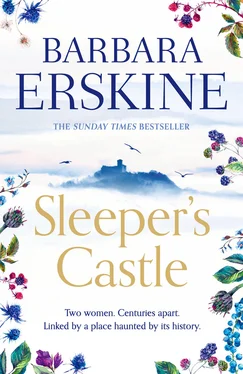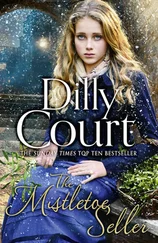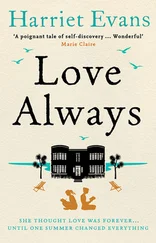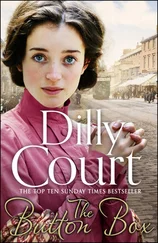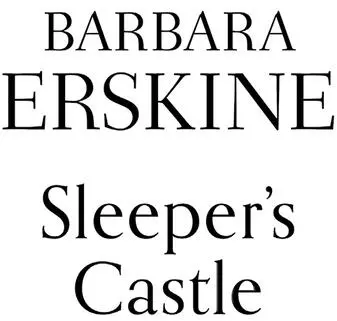

Published by HarperCollins Publishers Ltd
1 London Bridge Street
London SE1 9GF
www.harpercollins.co.uk
First published in Great Britain by HarperCollins Publishers 2016
Copyright © Barbara Erskine 2016
Cover design © HarperCollins Publishers Ltd 2017
Cover photographs © Cristina Lichti / Arcangel Images (castle in fog); Shutterstock.com(flowers and berries).
Barbara Erskine asserts the moral right to be identified as the author of this work.
A catalogue copy of this book is available from the British Library.
This novel is entirely a work of fiction. The names, characters and incidents portrayed in it are the work of the author’s imagination. Any resemblance to actual persons, living or dead, events or localities is entirely coincidental.
All rights reserved under International and Pan-American Copyright Conventions. By payment of the required fees, you have been granted the non-exclusive, non-transferable right to access and read the text of this e-book on screen. No part of this text may be reproduced, transmitted, down-loaded, decompiled, reverse engineered, or stored in or introduced into any information storage and retrieval system, in any form or by any means, whether electronic or mechanical, now known or hereinafter invented, without the express written permission of HarperCollins.
Source ISBN: 9780007513161
Ebook Edition © April 2017 ISBN: 9780007513185
Version: 2017-10-23
Praise for Barbara Erskine:
‘Evocative and haunting. [I was] every bit as captivated as I was when I was swept away by Lady of Hay . I have loved the journey and the history’
Sunday Times bestseller, Elizabeth Chadwick
‘Barbara is a master storyteller who knows just how to weave the twists and turns of a gripping thriller, with that unique and spell-binding blend of history and the supernatural … Every new book by Barbara is an event to be pleasurably anticipated’
Acclaimed historian and novelist, Alison Weir
‘The author’s storytelling talent is undeniable. Barbara Erskine can make us feel the cold, smell the filth and experience some of the fear of the power of evil men’
The Times
‘Captivating storytelling, vivid, passionate characters, beautifully evoked and impeccably researched historical settings, and, best of all, those terrifying but beguiling ghosts that whisper to us from the past … You’ll be transfixed’
Richard and Judy bestseller, Rachel Hore
‘I was utterly absorbed and swept up in Sleeper’s Castle … I was totally immersed in the landscape of the border Marches. The characters will live on in my imagination for a long time’
Author Sophie Duffy
‘I cannot believe it is thirty years since Lady of Hay introduced me to a whole new interpretation of my favourite genre – historical fiction with a twist of ghostly thriller’
Joanna Hickson, author of First of the Tudors
Time
The past, present and future regarded as a continuous whole
Collins English Dictionary
A space of continued existence, as the interval between two successive events or acts, or the period through which an action, condition, or state continues
The Shorter Oxford English Dictionary
Oneirology
The science or subject of dreams, or of their interpretation
Oneiromancy
Divination by dreams
Table of Contents
Cover
Title Page
Copyright
Praise for Barbara Erskine:
Epigraph
Prologue
Chapter 1
Chapter 2
Chapter 3
Chapter 4
Chapter 5
Chapter 6
Chapter 7
Chapter 8
Chapter 9
Chapter 10
Chapter 11
Chapter 12
Chapter 13
Chapter 14
Chapter 15
Chapter 16
Chapter 17
Chapter 18
Chapter 19
Chapter 20
Chapter 21
Chapter 22
Chapter 23
Chapter 24
Chapter 25
Chapter 26
Chapter 27
Chapter 28
Chapter 29
Chapter 30
Chapter 31
Author’s Note
Historical Note
About the Author
Also by Barbara Erskine
About the Publisher

In the never-ending battle between the principalities of Wales and their aggressive, acquisitive neighbours, the victorious king, Edward I of England, having subdued the native princes had banned the bards, recognising their power, their ability to remember, their position in society as the keepers of memories of freedom and power. To be a bard was to be the inspiration of a people; to be the instigator of longing for freedom; it was a position of enormous influence.
To be a bard was now punishable by death.
Bards had come back of course. Or never gone away.
For two hundred years the Welsh people lay under the English yoke, their impatience growing, their dissatisfaction ever increasing, their bards and poets studying the dream of independence. They were waiting for Y Mab Darogan, the Son of Destiny, who would come to liberate them and make them a great nation once more.
In the middle of the fourteenth century such a man was born, his arrival heralded by a comet in the sky. By the year 1400 he was ready for his destiny.
In their dream they smelt smoke. Far below the hillside where they stood the castle nestled within the angle of the great river, a black silhouette against the green of flood-meadow grass. The keep stood four-square, the stone walls massive cliffs pierced by slit windows, lit from without by the dying sun and from within by fire. The moan of the wind and the yelp of circling kites were broken by the occasional thunder of cannon fire and they thought they could hear the screams of injured men. Creeping closer to the edge of the wood, heart in mouth, they watched the topmost battlement crumble and heard the crash of falling stone. The cannon fell silent and there was a roar of cheering, though from here they could see no men, no banners, no rippling standards. The smoke grew thicker as the green-cut oak of the ceiling beams began to burn, the smell sweet on the air until, slowly, insidiously, it was flavoured with a rancid undertone of smouldering fabric and burning wool, as ancient dusty wall hangings and cushions, banners and silks from a bygone age flared and collapsed into the conflagration. Then, a sharp thread winding through the smell, the scent of cooking mutton and beef as the animals, herded into the shelter of the curtain walls, began to roast alive; and with the burning flesh of animals outside the walls was mingled the scent of the burning flesh of men.
Horrified, they watched, hidden in the trees, hands clutching the mossy trunks, fingernails clawing at the lichen-stained bark. Far below they heard the crash as the roof of the keep fell and they saw the sparks fly up in the wind, a curtain of shimmering red against the smoke-filled sky.
When they woke, suddenly, with the sweat of fear icy on their bodies, they lay staring up at the ceiling in the dark and then slowly moved their heads, still hardly daring to move, to look towards the window where the sky was growing light behind the shoulder of the hill. They climbed from bed and padded to the window, leaning on the cold stone of the sill, looking out between the mullions, shivering, knowing that it had been a dream, seeing the sky clear, watching the silver crescent of the moon lying on its back above the trees.
Читать дальше
